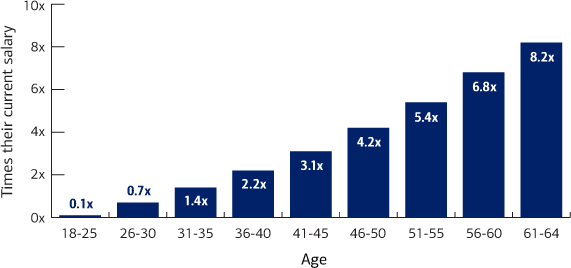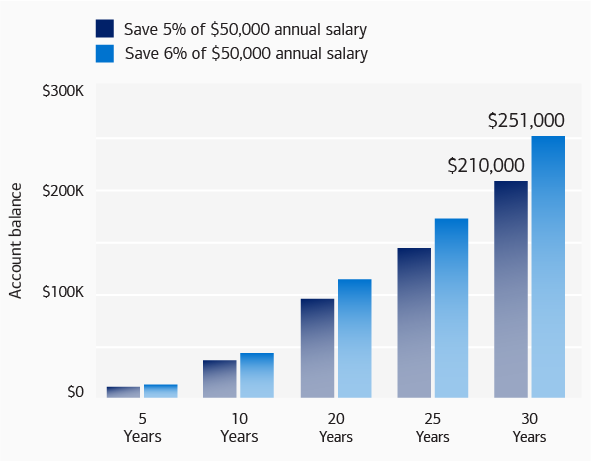How Much Money Should You Have Saved For Retirement
How much do you really need to save for retirement?
Retirement experts have offered various rules of thumb about how much you need to save: somewhere near $1 million, 80% to 90% of your annual pre-retirement income, 12 times your pre-retirement salary. But what's right for you? And how do you know you're on track?
"Because there are so many variables, even the retirement researchers can't agree on a total dollar amount," says Ben Storey, director of Retirement Thought Leadership at Bank of America. "What each person needs will vary widely based on a number of factors." These factors include your current age, and the age at which you plan to retire or could be forced to retire due to declining health, the loss of a job, or other circumstances beyond your control; how long you expect to live, based on family history; how much you plan to spend in retirement; and what your sources of retirement income will be.
You may be surprised how much — or how little — even generously-sized accounts could potentially provide over the course of a retirement. The examples below illustrate how much a 65-year-old might safely withdraw in the first year of retirement.
| Savings value at age 65 | Annual income from savings* | |
| $300,000 | | $12,270/year |
| $1,000,000 | | $40,900/year |
| $1,500,000 | | $61,350/year |
* The accumulated investment savings by age 65 could provide an annual retirement income, adjusted for future inflation (in today's dollars), of this amount for a life expectancy of 91 years, if withdrawn at a sustained spending rate of 4.09%.
Source: Chief Investment Office, Portfolio Analytics, "Beyond the 4% rule: Determining sustainable retiree spending rates," January 2020.
Just how big your nest egg should be and how long it might last will depend not only on what you save and invest, but also on how you spend it once you do retire. Here are some of the factors to consider as you determine what your unique savings goal should be.
Base your retirement savings estimate on what you expect to spend
"Having a percentage or dollar amount to give you a rough idea for planning can be helpful, but you can't be focused solely on that," Storey says. "Everybody's lifestyle is different. What they want to do in their retirement years may be very different as well." Rather than rely on a general figure, he suggests trying to create a ballpark annual estimate based on what you live on now and what might change when you retire.
The following chart, based on data from the Employee Benefit Research Institute (EBRI),Footnote 1 can give you a rough idea of how your expenses for housing,Footnote 2 food, health, transportation, clothing and entertainment may change during retirement to help you decide how much income you might need. If you plan to travel or entertain more — or pursue an expensive hobby — you'll want to think about adding in something for those more flexible, discretionary expenses, too.
Here's how older Americans today spend their money.
| Ages 50-64 | Ages 65-74 | Ages 75 and older | |
| Housing | 47.3% | 45.8% | 48.84% |
| Food | 12.6% | 13.2% | 11.9% |
| Health | 7.6% | 10.8% | 10.4% |
| Clothing | 3.2% | 3.1% | 2.9% |
| Transportation | 13.3% | 12% | 9.5% |
| Entertainment | 8.4% | 8% | 6.5% |
| Other | 3% | 3.9% | 5% |
Source: Zahra Ebrahimi, "How Do Retirees' Spending Patterns Change Over Time?" EBRI Issue Brief, no. 492 (Employee Benefit Research Institute, October 3, 2019).
Remember, although some costs — such as health care — may increase in retirement, there may be savings elsewhere. "Researchers have found that once people retire they spend more time shopping carefully and preparing meals at home, for example. Their cost of living for items such as these goes down," Storey says.
Keep in mind all of the income sources that can help cover your expenses
As you explore how much money you might really need in retirement, remember that the amount you decide to save and invest on your own is only one component of your future retirement income.
Most Americans will have Social Security as the backbone of their retirement savings. (Even if benefit payments are reduced in the future, Social Security is not likely to go away.) And don't forget about other sources of income that may be available to you many years from now, including the money in your workplace and personal retirement accounts, pensions, annuities, proceeds from selling your home or business, rental income or an inheritance.
Working in retirement: expectations vs. reality
If you're planning to work in retirement so you can save less today, be realistic about your expectations. The annual Retirement Confidence Survey from the Employee Benefit Research Institute (EBRI)* has consistently found that American workers are far more likely to expect to work in retirement than actually end up doing so.
In EBRI's latest report, 71% of respondents planned to work in retirement, compared with just 31% of retirees who report they have worked for pay in retirement."
* Employee Benefit Research Institute 2020 Retirement Confidence Survey, April 2020.
Two ways to check on your progress right now
Understanding your post-retirement expenses and income can help you estimate how much you may need to draw from your personal savings each year in retirement. However, it can be tough to turn that goal into a realistic amount to invest today when your goal is decades away. Here are two ways you can check on your progress to see if any changes should be made.
- For a quick check of how you're doing today vs. similar savers:
Just as it can be helpful to see how your heart rate, blood pressure or weight compare with the "norm" when you get your annual physical, you can now assess how your retirement savings stack up against your peers by using the Net Wealth to Income Ratio developed by Merrill.
With findings based on the Financial Wellness Tracker, consider using the following savings multiples as guidance for confidently replacing your income in retirement:

Source: Bank of America, "Financial Wellness: 2020 Retirement savings guidance," 2020. Note: Calculations are based on obtaining 38% of income replacement from retirement savings (pre-tax) for middle income households of $40,000 to $100,000 annually.
For example, if 35-year-old Jane, who earns $70,000 a year, wants to see how her savings measure up to the best savers in her age group, she would just multiply her current salary by 1.4 and compare that with her current savings. Thus, to keep up with the "best savers and investors" in her peer salary group, she would need to have saved $98,000 ($70,000 x 1.4) so far.Footnote 3
- To see where you are and what you can change to stay on track for the future:
The Merrill Personal Retirement Calculator lets you view a projection of your savings to see if there is a gap between what you'll have and what you'll need when you finally retire and helps you adjust your strategy accordingly.
With the calculator, you can see how potential adjustments to your savings goal, retirement date and investment choices can affect the size of your retirement savings in the future.
For Merrill clients, the Retirement Evaluator (login required) allows you to quickly import all of your Merrill investment information to test similar scenarios.
But even if these checkpoints show that you're behind where you might be, don't get discouraged by the big numbers you may see, advises Storey.
A small change in savings could give you substantially more after 30 years.

Source: Bank of America, April 2017. This example is hypothetical and does not represent the performance of a particular investment. This example assumes annual returns net of fees and expenses. Your results will vary. Actual investing includes fees and other expenses that may result in lower returns than this hypothetical example.
Whatever you save and invest today for the long term can make a big difference in the future. "If you need to save more, even a 1% increase can mean a lot over time," he says.
Footnote 1 Based on estimates from the Health and Retirement study (HRS) and the Consumption Activities and Mail Survey (CAMS) in Employee Benefit Research Institute notes.
Footnote 2 Note: Housing costs include mortgage or rent payments, property insurance, property taxes, utilities and maintenance. They typically go down in retirement because mortgages are paid off, property taxes are less due to downsizing, and utility bills are lower with fewer people in the household.
Footnote 3 This number refers to financial assets minus personal (non-mortgage) debt. "Best savers and investors" refers to those whose Net Wealth to Income Ratio is in the top quintile.
Investing involves risk. There is always the potential of losing money when you invest in securities.
This material should be regarded as (general or educational) information on Social Security considerations and is not intended to provide specific Social Security advice. If you have questions regarding your particular situation, please contact your legal or tax advisor.
3504555-EXP032322
How Much Money Should You Have Saved For Retirement
Source: https://www.merrilledge.com/article/how-much-do-you-really-need-to-save-for-retirement#:~:text=Retirement%20experts%20have%20offered%20various,times%20your%20pre%2Dretirement%20salary.
Posted by: rubioearanting.blogspot.com

0 Response to "How Much Money Should You Have Saved For Retirement"
Post a Comment